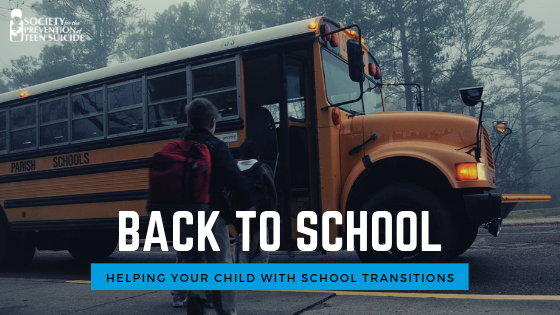
Helping Your Child With School Transitions
September is upon us again and as always, it is a time of transition for all! For some kids going back to school alone can be an anxious and scary time, but what if your child is a kindergartener transitioning to school for the first time? Or an eighth grader going on to high school? Or a high school graduate on their way to college? Whether they are transitioning to a new school because of traditional reasons or moving to a new school from another area, change can be very stressful and overwhelming.
How can we as adults and parents help children move through these transitions with the least amount of strife? We can begin by realizing that our approaches depend on the age of the child. With younger children, dealing with a new school or even a new home may trigger them to “act out”. This can look like their withdrawal from social activities or even changes in their diet and sleeping patterns. Transitioning to high school can be equally challenging for different reasons: facing competitive academics, fitting in with peers and trying out for extracurricular activities like athletics, arts or music. College comes with a whole new set of challenges. Often our children have imagined a “perfect” college experience and when it doesn’t happen, they can become disillusioned and stressed.
As parents/guardians it is natural to want to minimize the stress and anxiety that comes with new school year transitions. Here are some tips that we can share to help kids cope or manage the changes and adjustments they experience during these transitions:
1) Deal with anxiety
Transitions bring with them some fear of the unknown, which can make many of us feel very anxious. A helpful strategy can be to relabel that anxious feeling as excitement. When you rename anxiety as excitement you focus on the positive aspects of anticipation while excluding the fears that lead to sleepless nights! Ask your child what they imagine about the transition they are facing. Sometimes when children are worried about things, they imagine the worst. Ask them to picture themselves arriving at their new school, happy, confident and ready for a great new beginning. Encourage your child to use their imagination in a positive way!
2) Allow time and space to talk about feelings

As the transition approaches it is important to allow your child to talk about their feelings. Freshman, for example, may look forward to high school with anticipation, but may also be sad about leaving their old school, teachers, and building. Even youth going off to college may feel some sadness at leaving their high school years behind. Talking and validating these feelings can be helpful. Explain that feeling sad about a change only means your previous experience was good. Point out to your child that they can use that previous experience to create a calm sense that things will go well again. If their previous experience was not good, they can look at this transition as a new start with the chance to have things go better in the future. If your child doesn’t like to talk about feelings, give them the opportunity to explore feelings through art, writing, music, journaling or play.
3) Be prepared
Any time you can tour a school with your child and give them a sense of how to navigate a strange environment, you will calm your nerves and theirs. Show you child where they need to go if they feel they need help during school hours and identify key faculty in the school. If it is a college campus, make sure they know where the student health center is as well as the school counseling center. Remember mental health is as important as physical health!
4) Create routines, and stick to them
Getting in the habit of doing the same thing at bedtime and keeping to a schedule can help with sleep patterns. It is important to turn off all social media at bedtime. If possible, remove phones and devices that will tempt your child to stay up too late. In the morning, waking-up at the same time, having clothes laid out and eating breakfast are excellent ways to establish a routine and decrease the hectic pace of the morning. It is also helpful to give children count down times. For example: “We need to leave in 20 minutes, 10 minutes now until we have to leave.” This can help them organize their morning timelines more effectively.
5) Encourage friendships

Friends can make a difference. Most kids need to be around other kids to feel connected. Children don’t need a lot of friends, but a connection to another child is very important and decreases feelings of being alone or misunderstood. Children also need to feel connected to their parents. If they are young, spending time cuddling with them for 5 minutes in the morning and at bedtime can be very reassuring. Older children need time with you as well! Make sure you are checking in with them and giving them the opportunity to talk about their day and the things that went well as much as the things that may have been upsetting. This includes checking in with your freshman in college, even if it is only in a text message. Let your kids know you are there for them!
6) Get involved, and stay involved
When your child is starting a new school, help them navigate the culture of that school. Ask teachers, coaches, and counselors what groups or activities the school offers that could help your child transition more easily. What does the school do to welcome a new student? Is there a buddy system? Speak with the teachers to follow-up after the initial transition to see what they are observing in the classroom; does it differ from what you are seeing at home? Create a dialogue with the teachers and begin to work as a team in the best interest of your child.
7) Remember the importance of your home environment
Lead by example – your children look to you as their role models. They will model your sleep patterns, eating patterns and the way you cope with stress. Create healthy patterns of behavior that work for the entire family, for example, sleeping at least 8 or more hours a day, eating 3 well balanced meals or starting the day with exercise, meditation, or music. Effective time management is one of the easiest ways to reduce morning stress in the home. If you are yelling and rushing your child out the door, they will arrive at school with a higher level of stress that can affect their performance all day. Also remember that being on time after school for pick-up can alleviate another level of anxiety. Being where you said you would be – on time – gives your child a sense of reassurance that they can count on you to have their back.
8) Encourage self-confidence
As parents and guardians, we spend much of our time telling our children how special they are. As much as children need our love, support and praise, they also need to learn to feel good about themselves because of what they think of their talents and achievements. Self-confidence comes from intrinsic factors – what we think about ourselves – as much as what other people think about us (called extrinsic factors). Always ask your child what they think of what they’ve done, their favorite part of their art project, for example. Getting a child to think positively of themselves builds self-awareness and confidence. Allow them to explore their passions and interests with no judgement. For the first days of school, let them pick out the outfits that they feel good in. You may need to interject a bit of parental guidance, however, to make sure they are going in clean and well-groomed, ready to face the day! First impressions do count!
9) Remember: You Are NOT Alone!

Sometimes we get so worried about our child’s own situations we forget that others are in the same position. All freshmen in high school are new, and all freshman in college are new to the campus. Point out to your child that almost everybody, including the teachers, is feeling some anxiety about this new beginning. This helps remind both you and your child that you’re in good company!!! Just look next to you!
Don’t forget, change is a part of life. It is important to remember that we don’t learn all of our lessons in school. We learn the most important lessons in life as we live through them. Try to think positive and not see change as a big scary thing but more as a part of life. Communicate to your child, whenever you can, that the only thing we can guarantee in life is change so it’s important to learn how to cope with it.
So, at the end of the day, keeping your thinking positive can change anxiety into excitement and increase your child’s resiliency to change. Try and stay aware of both your feelings and your child’s in the beginning and notice how they change after a few weeks. Note the progress! Point out to your children how things are improving and acknowledge how proud you are of them. The more we practice change the better we become at it!
If you feel, however, like your child is not progressing and working through the changes of transition, look for professional help.
By Susan Tellone, RN, BSN, CSN, MSN
SPTS Clinical Director

